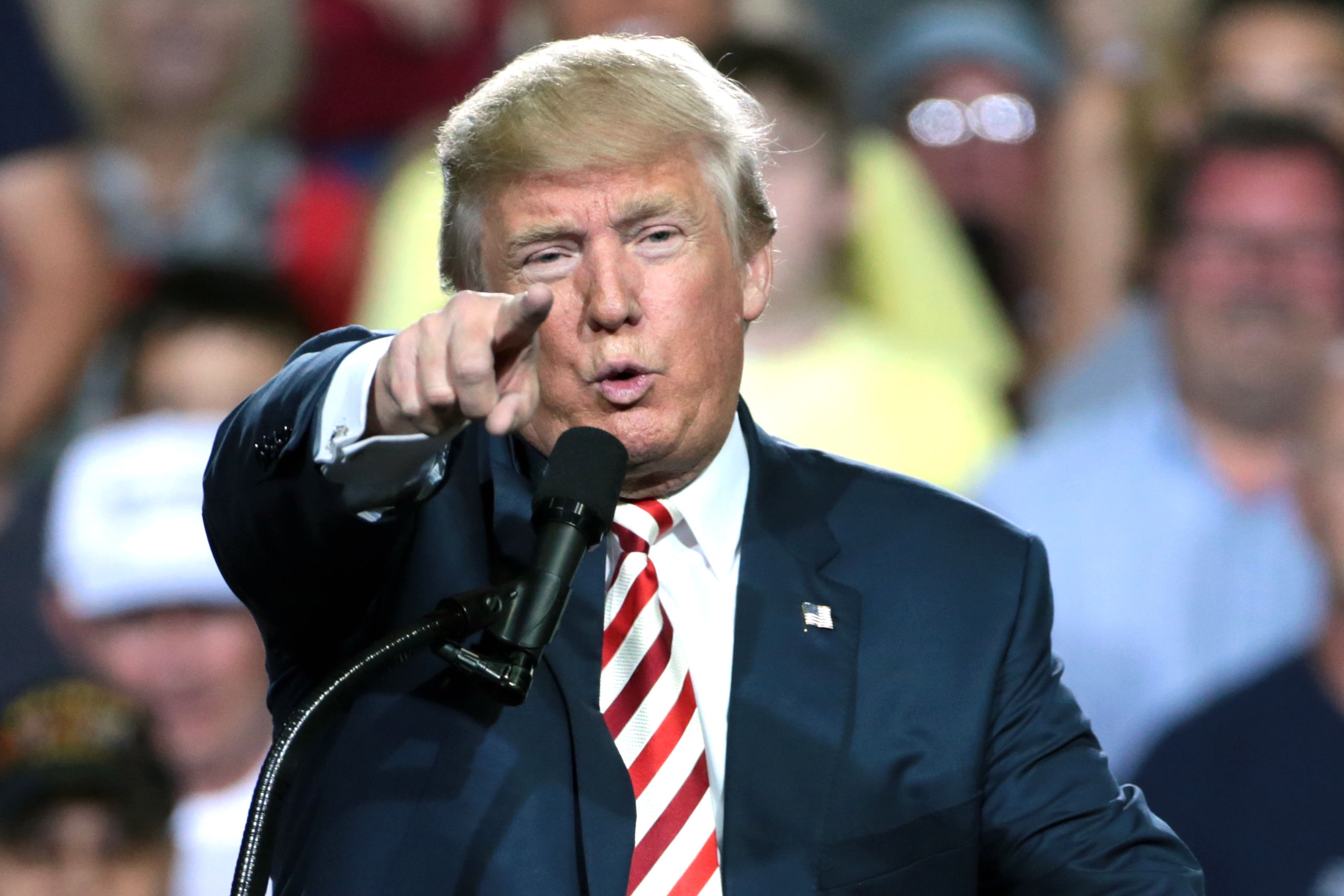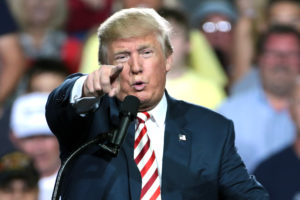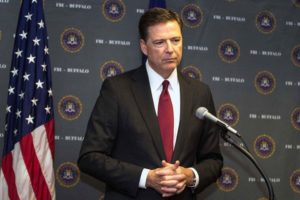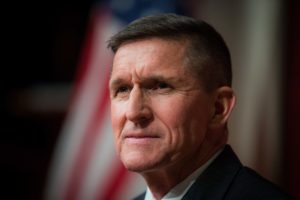Donald Trump – One Too Many Blunders
 President Donald Trump
http://bit.ly/2q1PKby
President Donald Trump
http://bit.ly/2q1PKby

http://bit.ly/2q1PKby
On May 9th, President Trump fired FBI Director Comey – only the second time an FBI director has ever been fired in the bureau’s 108-year existence. The following day, he shared sensitive classified information to Russian officials in the Oval Office. Donald J. Trump’s lack of experience with strategic decision-making and public office continues to be illuminated during his short time in office. Due to the president’s conduct, he is now being scrutinized as potentially threatening national security and obstructing justice.
James Comey’s termination was defended in a three-page memorandum, Deputy Attorney General Rod Rosenstein explained that the mishandling of then Secretary Clinton’s email investigation is the primary and seemingly sole cause of Comey’s firing. Oddly, Trump himself was in favour of Comey’s announcement of a new Clinton email probe. Trump stated that “it took a lot of guts” to reopen the investigation and that “he did the right thing.” This announcement, only 11 days before the presidential election, was made against the advise of the Justice Department and standard practice, due to its probable impact on the approaching election.
What makes this firing so controversial? For one, it was seemingly a rapid decision decided on by the president himself. There were no reports concerning ethics and legality by the Justice Department, and from what the public knows, only a few select officials knew of the action ahead of time. William Sessions–the only other FBI Director to be fired–came under scrutiny for using FBI resources for personal use, for general transportation, as well as for spending tax-payer dollars on home renovations. In contrast to President Clinton’s firing of Sessions following a lengthy internal ethics investigation and report from the DOJ that concluded Sessions was “evading taxes and refusing to cooperate with an investigation of a home mortgage loan,” Comey was fired based on a memorandum crafted by one individual in a few days time. It is also possible that Trump demanded that Comey be fired, and the DOJ faithfully wrote up an excuse to present to the public. Why did Trump wait months into his presidency to fire Comey for mistakes he made before Election Day?

http://bit.ly/2rx4SyN
The timing and reasoning behind this decision is eye opening. It has come to light that the Director requested additional funding and resources for the investigation into the Trump campaign’s ties to Russia and its influence in the presidential election only a few days before he was fired. Trump has complained multiple times that the investigation is a waste of time and there was no foul play in the election. The White House has also made remarks that the Russian probe is unproductive and unnecessary, in a reversal of general practice that the White House should not comment on active investigations – so as to not have any influence on their independent proceedings. The official argument that Comey circumvented the Justice Department by publicly sharing his findings and conclusions is a strong one. The FBI is responsible for accumulating evidence and reporting to the DOJ, which then decides whether a prosecution will go forward. It is not the place for the FBI Director to share his or her findings with the public. And yet, the case against Trump’s decision has only been building, as a memo written by Comey following a private meeting with Trump describes that Trump asked Comey to drop the case against National Security Advisor Michael Flynn. If this report is verified as accurate, Trump has clearly crossed a boundary and attempted to influence the independence of an FBI investigation, possibly obstructing justice.
The day following Comey’s termination, Trump had a meeting with Russia’s foreign minister and ambassador, in which he shared classified intelligence concerning the Islamic State. Even more obscure, only Russian press were allowed into the Oval Office during the meeting, causing uproar for its security. In a moment of total absurdity, President Putin of Russia offered to corroborate Trump’s position by sharing transcripts of the meeting and other disclosures Trump made to Russian envoys. The optics around these incidents proves to incriminate the president. Oddly enough, these are self-inflicted wounds. The president has made a mess of an already bewildering situation.

http://bit.ly/2qyM0SD
Trump contradicted his advisors and staff at multiple times concerning both issues. After the deputy press secretary and Vice President Mike Pence stated that Trump fired Comey on the basis of advise from the DOJ, he shared in an interview with NBC’s Lester Holt that he “was going to fire [Comey] regardless of [their] recommendation.” Later, Trump claimed he had the absolute right to share information with Russia pertaining to terrorism, contradicting the new national security advisor H.R. McCaster’s statement that the Washington Post story uncovering the discussion “as reported is false.”
Even more recently, a recording from June 15, 2016 has surfaced of House Majority Leader Kevin McCarthy claiming that he thinks Putin pays Trump. This was following a conversation about Russia’s encroachment on the Ukraine and the hack of the DNC mainframe. It seems clear that GOP leaders were discussing Russia’s involvement in election “and wanted to keep their concerns secret.” That these representatives would discuss the likelihood of Trump being compromised and keep their thoughts to themselves illustrates a lack of concern on their part for the proper functioning of the executive and national security.
All of these issues revert back to who Donald Trump is as an individual, as a person. It is not hard to argue that Trump is the most incompetent president in the history of the United States. As David Brooks explains in an NYTimes op-ed, Donald Trump evokes a child’s temperament and intellect. He is unable to focus his attention, requires perpetual approval from others, and lacks a theory of mind. Trump lacks the ability to perceive what others are thinking: “other people are black boxes that supply either affirmation or disapproval. As a result, he is weirdly transparent.”
Tony Shwartz, the author of Trump’s first book The Art of the Deal, shared his intimate understanding of the president in a Washington Post article. Shwartz points to a domineering and difficult father as the major source of Trump’s self-protectiveness and fragile ego. At the time, and likely to this day, Trump treated every encounter as a zero-sum game, “as a contest he had to win, because the only other option from his perspective was to lose.”
Over a year ago, many Americans sick of career politicians called for an outsider to lead the country, preferably a successful businessman. What we have learned is the American people have elected the worst type of businessman for their commander-in-chief. Trump is a businessman who is solely self-interested, obsessed with his image, and disrespects peers that, in his eyes, have nothing of value to offer. The president is a man without conscience, a man without defining ideological beliefs, a man with an inferiority complex who is largely self-absorbed, a businessman who “derives his sense of significance from conquests and accomplishments.” Worst of all, Trump has never been made to face reality up to this point. Since Trump inherited his wealth and owned the companies he managed, his word was final and few dared to disagree with him.
Now that Trump has come to realize he is accountable to the American people and will be held accountable by them, that officials take an oath of loyalty to the country and not to him, that he cannot strong-arm the Congress, the media or the public, he is scrambling for a way out in a world for which he was not bred.
